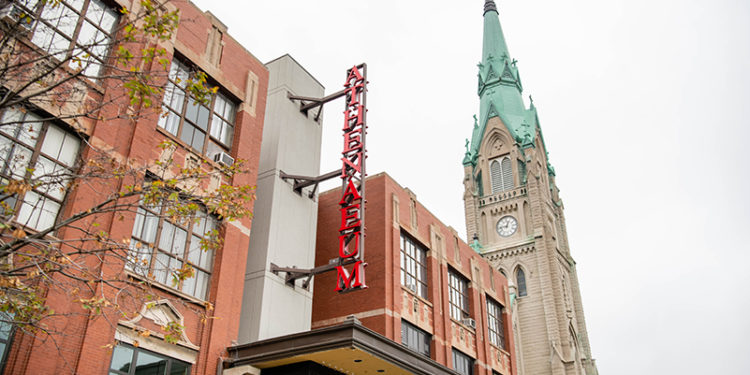Chicago-area residents will soon have a new venue to experience the beauty that music and theater can provide.
Well, maybe not a new venue. But an old venue going back to its roots.
A new not-for-profit group, the Athenaeum Center for Thought and Culture, has taken over the lease on the Athenaeum building next to St. Alphonsus Church at Wellington and Southport avenues. The building was originally constructed by the Redemptorists at St. Alphonsus in 1911 as “a home for the intellectual, physical and social intercourse” of their parishioners, according to Lawrence Daufenbach, the new organization’s executive director.
The rear half of the building houses a theater with nearly 1,000 seats, Daufenbach said. When it was built, it had everything from a bowling alley to a gymnasium and classrooms in the front half.
When the Redemptorists left St. Alphonsus, the theater was rented out, and now is believed to be the longest continually functioning off-Loop theater in Chicago. The front part of the building also has three smaller performance spaces, known as black box theaters.
Daufenbach said his group intends to keep the theater operating, but also wants revive the function of edifying and, in time, evangelizing audiences.
Beauty offers a way to connect people with the divine, said Daufenbach.
“From an evangelization standpoint, some people are transformed by hearing truth; for others, it’s beauty,” he said. “It leads to people asking those deeper questions.”
Auxiliary Bishop Mark Bartosic, a member of the center’s advisory board, said the church has always found truth in beauty.
“In ‘Evangelii Gaudium,’ Pope Francis says, ‘Proclaiming Christ means showing that to believe in and to follow him is not only something right and true, but also something beautiful,’” Bishop Bartosic said. “In many ways, contemporary secular culture is very much attuned to the beautiful. In line with the Holy Father’s teaching, we want to show how what is beautiful is connected to what is good and true … and to show how those three attributes, wherever we find them, together point straight to Jesus, who points to the Father. What Pope Francis says about beauty here is not new; he rather calls the church to build on ‘the wide variety of contemporary expressions so as to transmit the faith in a new language of parables.’”
Daufenbach and his wife, Katie Joy Daufenbach, are parishioners at St. Alphonsus, and Daufenbach had been thinking for a while about how to put the Athenaeum building to better use. The thought first came to him while on his honeymoon he said, and what felt like a nudge from God got more intense when the COVID-19 pandemic struck and he had to put his other business, which rents camera equipment to film crews, on hold.
The new Athenaeum Center for Thought and Culture will open its doors for the first time Nov. 14 with “Dante 360,” featuring art historian Elizabeth Lev and the renowned vocal ensemble Schola Antiqua celebrating the Year of Dante through music, performance and art inspired by the great Italian poet.
“It’s the Year of Dante in Italy, and if you look at the proscenium of our theater, there’s a big medallion of Dante meeting Beatrix right over the stage,” he said. “So we thought, let’s take people through the Divine Comedy. It’s kind of going to be a combined talk and performance.”
The organization is also embarking on a $4 million renovation of the front half of the building, removing one of the three black box theaters and adding event space.
“The idea is that you would see a performance, then walk down the gallery hall into the event space for conversation or a talk-back,” Daufenbach.
Daufenbach said he would like the center to be a place where “artists can be comfortable being Catholic and exploring ideas. … This world needs beauty not to sink into despair.”
The event space and the theaters also will be available for rental, he said.
“These beautiful spaces will serve in so many capacities,” he said. “We think our programming will grow.”
For more information and ticket information for Dante 360, visit athenaeumcenter.org/dante.
Credit: Source link




